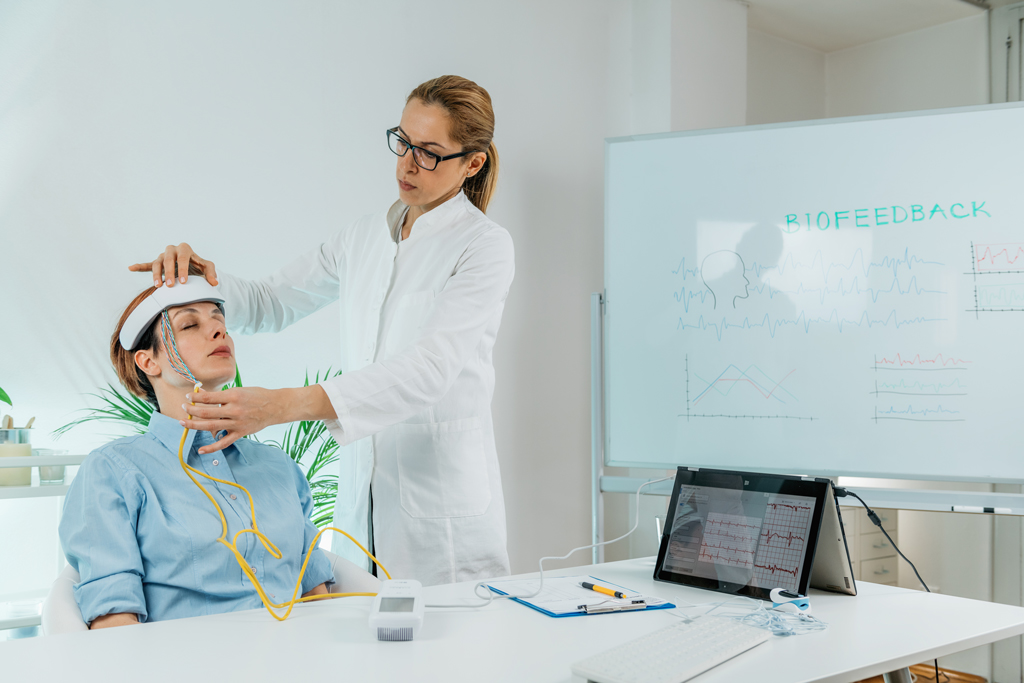Biofeedback for Depression
Biofeedback for depression is a great treatment option for those who have already tried other treatment methods to decrease symptoms.
What is Biofeedback?
According to the World Health Organization (WHO), depression is the primary cause of disability. It affects an estimated 5% of adults worldwide.1 Biofeedback training is an effective treatment option for various types of depression, which can include treatment-resistant depression. Several studies have shown significant improvements in symptoms in individuals who have undergone biofeedback for depression.2
Biofeedback is a form of therapy that uses technology and sensors to measure various physiological functions in the body. These physiological functions may include heart rate, blood pressure, and muscle tension. This information is then provided to the depressed individual in real-time. It allows them to become more aware of their body’s stress responses and learn how to regulate them.

Contact Profound Treatment to Learn More
Our team is standing by to discuss treatment options with you. Your call is completely confidential and no obligation is required.
When Is It Used?
Biofeedback therapy is a non-invasive, drug-free treatment option for individuals with depression who may not be able to take certain medications because of underlying medical issues. Biofeedback therapy is used to treat various underlying conditions that cause depression, including stress and anxiety.
How It Works
During the biofeedback for depression therapy session, the individual is connected to sensors that measure physiological activity. These sensors send signals to an electronic monitoring device, which displays the physiological activity in real time. The practitioner uses this feedback to teach the individual how to control their physiological responses to stress and potential risks or causes contributing to their depression.
What is Depression?
Depression is a mental health disorder characterized by persistent feelings of sadness, hopelessness, and a lack of interest or pleasure in activities. Depression can affect anyone at any age and is one of the most common mental health disorders.
It’s a serious medical condition that can interfere with a person’s daily life and well-being. Various factors, including genetics, life events, and chemical imbalances in the brain, can cause depression.
Symptoms of Depression
Depression symptoms vary for each individual and can range from minor to severe. Note that everyone experiences these emotions sometimes and having one or two symptoms does not necessarily mean a person has depression. If you or a loved one is experiencing several of these symptoms for an extended period, it’s important to seek help from a mental health professional.
Common Symptoms
Common symptoms of depression include:
- Sadness
- Low energy
- Loss of appetite
- Lack of interest in things that used to bring you joy
- Trouble sleeping
How Long Can Depression Last?
Depression can last for a short period of time, or it can be a chronic condition that persists for months or even years. The duration of depression depends on several factors, such as the severity of the depression, underlying mental illnesses, and the availability and effectiveness of treatment.
In some cases, individuals may experience recurrent episodes of depression. To receive a diagnosis of depression, a person must have experienced symptoms of the condition for at least two weeks.3
Impact of Depression
Depression can significantly impact a person’s life, affecting their ability to work, maintain relationships, and engage in daily activities. It can also physically affect the body, such as changes in appetite, sleep patterns, and energy levels. Depression can lead to feelings of worthlessness, hopelessness, and even suicidal thoughts.
Areas of the Brain That Affect Mood and Cause Depression
Mood disorders such as depression are complex conditions that are thought to involve multiple brain regions and mechanisms. While the exact causes of depression are not fully understood, research has identified several areas of the brain that are involved in developing depression.
- Amygdala
- Thalamus
- Hippocampus
- Prefrontal cortex
Biofeedback for Depression
Biofeedback for depression is effective in reducing symptoms of depression, especially when used in combination with other treatments such as medication and cognitive-behavioral therapy. It can help people with depression learn to control and regulate their physiological responses.
This can reduce symptoms such as muscle tension and headaches that may contribute to their depression. Biofeedback helps individuals suffering from depression in the following ways:
Help Improve Your Mood
Biofeedback for depression therapy can potentially help improve mood in depressed individuals by helping them learn to control and regulate their physiological responses. During biofeedback therapy, doctors teach depressed individuals relaxation techniques, such as deep breathing, that can reduce stress and anxiety and improve mood.
Can Help Boost Self-Esteem
By learning how to relax and manage their symptoms, people with depression may feel more in control of their lives and better able to cope with their challenges. This can lead to improved mood and a sense of accomplishment and empowerment, which can boost self-esteem.
How Does Biofeedback Work with Depression?
The goal of biofeedback for depression is to help individuals identify and change negative patterns of thought and behavior that contribute to their depression. During a biofeedback session, an individual is connected to sensors that measure specific physiological responses, such as heart rate or skin temperature. These sensors are connected to a biofeedback machine, which displays the data in a visual or graph format.
Using the data from the biofeedback machine, the therapist will teach the individual how to recognize and modify the psychological response through relaxation techniques. Individuals can gain control over their emotional and mental states by learning to control their physiological responses. This can help reduce feelings of hopelessness and helplessness.
Manage Thoughts and Emotions
When individuals experience stress or negative emotions, their bodies respond with physical changes such as increased heart rate and muscle tension. By using biofeedback for depression training to monitor these physiological responses, individuals can learn to identify and manage their body’s stress response.
Biofeedback therapy can also teach individuals how to identify and change negative thought patterns contributing to their depression. This can help to reduce the severity of their depression symptoms.

Useful Links
Licensed by the State Department of Health Care Services.
Profound Healing Centers License No: 191092BP Exp. 5/31/26 (current/active)
Profound Healing Centers License No: 191092AP Exp. 7/31/25 (current/active)
Profound Treatment License No: 191047CP Exp. 1/31/27 (current/active)
Profound Treatment License No: 191047AP Exp. 8/31/26 (current/active)
Profound Treatment License No: 191047EP Exp: 3/31/26 (current/active)
Profound Treatment License No: 191047DP Exp. 9/30/25 (current/active)
Click here for more information about DHCS licensing.
| Start your healing today>> | |
|---|---|
| (310) 929-9546 |







